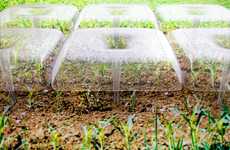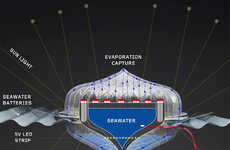
Illegal Rainwater Catchment May Become Legal and Required in LA
Katie Cordrey — February 15, 2010 — Eco
References: treehugger & elementsixmedia
The Los Angeles Department of Public Works has unanimously approved an ordinance requiring that rainwater from heavy rainstorms be captured, reused, or redirected. Compared to constructing more energy-intensive desalination plants, rainwater harvesting and diversion is a sensible alternative.
Several states in the west have 19th century laws that make catching rainwater illegal. The argument goes something like, “if people catch water out of the sky, it can’t run into streams for which someone downstream may have water rights.” Science doesn’t really support the assertion: About 97% of rainwater never makes it to a waterway, a fact which countries like Australia already know. The sensible Australians even subsidize rainwater catchment systems for their citizens.
The more that people rely upon rainwater, the less need they will have to draw groundwater begging the question, won’t it all sort of even out?
Several states in the west have 19th century laws that make catching rainwater illegal. The argument goes something like, “if people catch water out of the sky, it can’t run into streams for which someone downstream may have water rights.” Science doesn’t really support the assertion: About 97% of rainwater never makes it to a waterway, a fact which countries like Australia already know. The sensible Australians even subsidize rainwater catchment systems for their citizens.
The more that people rely upon rainwater, the less need they will have to draw groundwater begging the question, won’t it all sort of even out?
Trend Themes
1. Rainwater Harvesting and Diversion - The requirement for capturing and reusing rainwater is driving the trend towards the widespread adoption of rainwater harvesting and diversion systems.
2. Legalizing Rainwater Catchment - The push to make rainwater catchment legal is a trend that could create opportunities for new businesses and services to develop and facilitate rainwater capture and storage.
3. Decreased Reliance on Groundwater - A trend towards rainwater capture and reuse has the potential to reduce reliance on groundwater resources and encourage the development of more sustainable water management practices.
Industry Implications
1. Water Conservation - The movement to require rainwater capture and reuse is driving the water conservation industry and creating opportunities for companies that provide water-saving solutions.
2. Renewable Energy - Rainwater harvesting and diversion systems could be integrated with renewable energy solutions such as solar panels, creating opportunities for companies that specialize in both areas.
3. Home Improvement - The trend towards rainwater capture and reuse could create opportunities for businesses that provide home improvement services for the installation of rainwater harvesting systems.
4.2
Score
Popularity
Activity
Freshness























